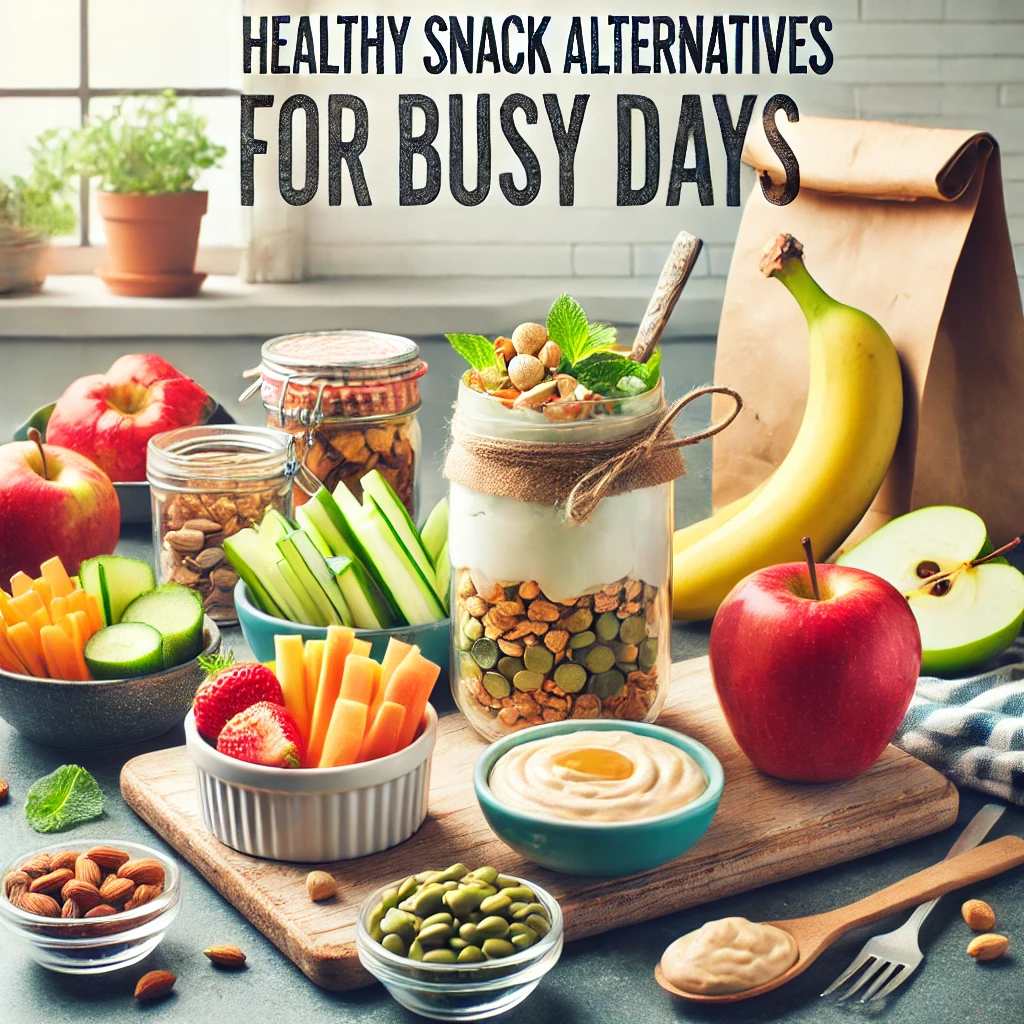In the whirlwind of modern life, finding time for proper meals can feel impossible. That’s where snacks come in! Unfortunately, not all snacks are created equal. Reaching for a candy bar or a bag of chips might be tempting, but it often leads to energy crashes and poor health outcomes. Instead, with a little planning, you can keep your energy levels high and your health in check by choosing healthy snack alternatives that suit your busy lifestyle.
Table of Contents
Why Healthy Snacking Matters
The Impact of Snacking on Overall Health
Healthy snacking is more than a trend; it’s a cornerstone of a balanced diet. Snacks bridge the gap between meals, providing your body with the nutrients it needs to maintain energy and focus. For example, a handful of almonds or a piece of fruit can help stabilize blood sugar levels, keeping your mood and productivity steady throughout the day.
Additionally, healthy snacking aids in weight management. When you consistently fuel your body with nutrient-dense foods, you’re less likely to binge eat during meals. Proper snacking ensures you’re meeting your daily nutritional requirements, especially when life gets too hectic for full meals.
Common Pitfalls of Unhealthy Snacking
On the flip side, unhealthy snacking can sabotage even the best diet plans. Many processed snacks are calorie-dense but nutritionally empty, loaded with refined sugars and unhealthy fats. These ingredients not only contribute to weight gain but also increase the risk of chronic conditions like diabetes and heart disease.
Moreover, mindless snacking—often done in front of a screen—can lead to overeating. Instead of satisfying hunger, these snacks leave you craving more, creating a vicious cycle that’s hard to break.
Key Features of a Healthy Snack

Nutritional Components to Look For
A healthy snack is like a mini-meal, designed to fuel your body effectively. Look for options rich in:
- Protein: Keeps you full and stabilizes blood sugar.
- Fiber: Aids digestion and provides lasting energy.
- Vitamins and Minerals: Boosts overall health and immunity.
For instance, a boiled egg paired with a slice of whole-grain toast offers protein and fiber in a compact, satisfying package.
Ingredients to Avoid
While shopping or preparing snacks, steer clear of:
- Excessive Sodium: Found in many chips and packaged foods, high sodium can cause bloating and high blood pressure.
- Added Sugars: Common in flavored yogurts, granola bars, and drinks.
- Artificial Preservatives: These can trigger allergies and are often linked to long-term health risks.
Portable Snack Ideas for Busy Schedules
Grab-and-Go Options
Busy schedules demand simplicity. Some of the best grab-and-go snacks include:
- Fresh Fruits and Veggies: Apples, bananas, baby carrots, and celery sticks are easy to pack and require no prep.
- Nuts and Seeds: Almonds, walnuts, and sunflower seeds provide healthy fats and protein in a compact form.
Pre-Packaged but Healthy
Not all pre-packaged snacks are bad. Choose wisely by checking the ingredient list for:
- Protein Bars: Opt for those with minimal added sugar and natural ingredients.
- Trail Mix: Make sure it’s free of added sugars and packed with nuts, seeds, and dried fruits.
DIY Snack Recipes for Maximum Control

Quick and Easy Recipes
One of the best ways to ensure you’re eating healthy snacks is to make them yourself. DIY recipes give you complete control over the ingredients, portion sizes, and flavors, so you can create options that suit your preferences and dietary needs.
- Energy Balls with Oats and Peanut Butter:
These bite-sized powerhouses are perfect for a quick energy boost. To make them, mix rolled oats, peanut butter, honey, and a handful of dark chocolate chips or dried fruits in a bowl. Roll the mixture into balls and refrigerate for at least 30 minutes. These no-bake snacks are rich in protein and fiber, making them perfect for curbing hunger between meals. - Greek Yogurt Parfaits with Granola and Berries:
Layer Greek yogurt, granola, and fresh or frozen berries in a jar for a delicious and nutritious snack. This parfait is loaded with protein, probiotics, and antioxidants. Use unsweetened yogurt and low-sugar granola for a healthier twist. Prepare them in advance and store them in the fridge for an easy grab-and-go snack.
Budget-Friendly Meal Prepping
Saving money while maintaining healthy eating habits is easier when you meal prep. Spending a couple of hours over the weekend can save you time and effort during busy weekdays.
- Preparing Snacks in Bulk for the Week:
Invest in reusable containers and portion out snacks like sliced vegetables, nuts, or whole-grain crackers. For example, pre-cut carrots, celery sticks, and bell peppers to pair with a small container of hummus. - Storing Snacks for Freshness and Convenience:
Use airtight containers or mason jars to keep snacks fresh. You can also freeze items like homemade granola bars or trail mix to extend their shelf life. Label your containers with the snack name and date to stay organized.
Special Considerations for Dietary Needs
Gluten-Free Snacks
Whether due to celiac disease or personal preference, gluten-free snacks can be both delicious and satisfying.
- Rice Cakes with Almond Butter:
Top plain rice cakes with almond butter and a sprinkle of chia seeds or sliced bananas for a crunchy, creamy treat. These are low-calorie and gluten-free, making them an ideal snack for any time of day. - Gluten-Free Crackers with Hummus:
Choose crackers made from almond flour or quinoa and pair them with hummus. This snack delivers a satisfying crunch with a dose of protein and fiber.
Vegan-Friendly Alternatives
For those following a plant-based diet, there are plenty of snack options that are as healthy as they are tasty.
- Edamame Pods:
Lightly salted edamame is an excellent vegan snack, rich in protein and fiber. Steam a batch and keep it in the fridge for a quick and satisfying option. - Avocado Toast on Whole-Grain Bread:
Spread mashed avocado over a slice of whole-grain bread and top it with a pinch of salt, pepper, and chili flakes. Add a squeeze of lemon for extra zest. This snack is filling and packed with healthy fats.
Tips for Sustainable Healthy Snacking Habits

Planning and Prepping Ahead
Consistency is the key to healthy eating habits, and planning ahead ensures you always have nutritious snacks at your fingertips.
- Weekly Grocery Shopping for Healthy Ingredients:
Create a list of healthy staples like fruits, veggies, nuts, seeds, and whole-grain options. Stick to your list to avoid impulse purchases of unhealthy snacks. - Using Portion Control for Calorie Management:
Even healthy snacks can lead to weight gain if consumed in large amounts. Invest in portion-sized containers to avoid overeating. For example, pre-pack 1-ounce servings of nuts or trail mix.
Staying Hydrated and Avoiding Mindless Eating
Hydration and mindful eating go hand in hand with healthy snacking.
- Drinking Water Before Snacking:
Sometimes, thirst can be mistaken for hunger. Drink a glass of water before reaching for a snack to determine if you’re truly hungry. - Creating a Designated Snacking Schedule:
Avoid grazing throughout the day by setting specific times for snacking. This habit not only prevents overeating but also helps you look forward to your snack breaks.
Conclusion
Incorporating healthy snack alternatives into your busy day doesn’t have to be complicated. From quick DIY recipes to thoughtful preparation for dietary needs, there’s something for everyone. Healthy snacking is a habit that pays dividends, improving your energy, mood, and overall well-being.
FAQs
1. What are some healthy late-night snack options?
Opt for snacks like plain Greek yogurt with a handful of berries, a small handful of nuts, or sliced cucumber with a bit of hummus. These are light, satisfying, and won’t disrupt your sleep.
2. How can I make healthy snacking fun for kids?
Use creative presentations like fruit kabobs, veggie sticks with colorful dips, or homemade trail mix. Involve kids in the preparation process to get them excited about healthy eating.
3. Are there any low-calorie snacks for weight loss?
Yes! Try air-popped popcorn, rice cakes with a thin spread of almond butter, or raw veggies with low-calorie dressing.
4. Can healthy snacks be stored for long periods?
Some snacks like homemade granola bars, nuts, and dried fruits can be stored for weeks if kept in airtight containers. Freezing prepped snacks can also extend their shelf life.
5. How can I avoid boredom with healthy snacks?
Mix it up! Rotate your options weekly, try new recipes, and experiment with different flavor combinations to keep things interesting.
6. How can I keep my healthy snacks fresh while traveling?
To keep snacks fresh on the go, use insulated bags or small coolers with ice packs for perishable items like yogurt or sliced fruits. For dry snacks like nuts or granola bars, airtight containers or resealable bags work best. Packing snacks in individual portions also helps maintain freshness and convenience while traveling.






